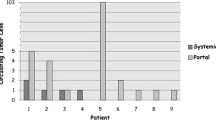Purpose
The clinical value of carcinoembryonic antigen messenger ribonucleic acid in the draining venous blood has been controversial because of short observation period. The authors prospectively investigated the clinical significance of detection of carcinoembryonic antigen messenger ribonucleic acid in the draining venous blood to predict hepatic metastases in patients with resectable colorectal cancer. METHODS: Drainage venous blood from 80 patients who underwent curative resections for colorectal cancer were obtained immediately before surgery to determine the presence of cancer cells by means of reverse transcription polymerase chain reaction. RESULTS: After an average follow-up period of 52.1 months, 7 of the 35 patients (20 percent) with positive carcinoembryonic antigen messenger ribonucleic acid had hepatic metastases, whereas 2 of the 45 patients (4.5 percent) with negative carcinoembry onic antigen messenger ribonucleic acid had hepatic metastases. The cumulative probability of hepatic metastatic recurrence rate differed significantly between two patient groups with positive or negative carcinoembryonic antigen messenger ribonucleic acid expression in the drainage vein (log-rank, 4.900; P = 0.0269). However, 28 of the 35 patients (80 percent) with positive carcinoembryonic antigen messenger ribonucleic acid did not have hepatic metastases. Additionally, Cox proportional hazards models identified the presence of lymph node metastases as the only independent predictor of hepatic metastatic recurrence. CONCLUSIONS: This study failed to demonstrate the high predictive value of carcinoembryonic antigen messenger ribonucleic acid detection in the draining venous blood for the development of hepatic metastases. However, the authors demonstrated that the presence of cancer cells in the draining venous blood was the essential and initial step to the development of hepatic metastasis.
Similar content being viewed by others
References
Gliffith JD, McKinna JA, Rowbotham HD,et al. Carcinoma of the colon and rectum: circulating malignant cells and five-year survival. Cancer 1973;31:226–36.
Taylor I. Liver metastases from colorectal cancer: lessons from past and present clinical studies. Br J Surg 1996;83:456–60.
Sales JP, Wind P, Douard R,et al. Blood dissemination of colonie epithelial cells during no-touch surgery for rectosigmoid cancer. Lancet 1999;354:392.
Garcia-Olmo D, Ontanon J, Garcia-Olmo DC,et al. Experimental evidence does not support use of the “no-touch” isolation technique in colorectal cancer. Dis Colon Rectum 1999;42:l449–56.
Bessa X, Castells A, Lacy AM,et al. Laparoscopic-assisted vs. open colectomy for colorectal cancer: influence on neoplastic cell mobilization. J Gastrointest Surg 2001;5:66–73.
Taniguchi T, Makino M, Suzuki K,et al. Prognostic significance of reverse transcriptase-polymerase chain reaction measurement of carcinoembryonic antigen mRNA levels in tumor drainage blood and peripheral blood of patients with colorectal cancer. Cancer 2000; 89:970–6.
Sadahiro S, Suzuki T, Tokunaga N,et al. Detection of tumor cells in portal and peripheral blood of patients with colorectal carcinoma using competitive reverse transcriptase-polymerase chain reaction. Cancer 2001; 92:1251–8.
Yamaguchi K, Takagi Y, Aoki S,et al. Significant detection of circulating cancer cells in the blood by reverse transcriptase-polymerase chain reaction during colorectal cancer. Ann Surg 2000;232:58–65.
Ueda T, Furui J, Komuta K,et al. Detection of carcinoembryonic antigen mRNA in the mesenteric vein of patients with resectable colorectal cancer. Surg Today 1998;28:701–6.
Gerhard M, Juhl H, Kalthoff H,et al. Specific detection of carcinoembryonic antigen-expressing tumor cells in bone marrow aspirates by polymerase chain reaction. J Clin Oncol 1994; 12:725–9.
Mori M, Mimori K, Ueo H,et al. Molecular detection of circulating solid carcinoma cells in the peripheral blood: the concept of early systemic disease. Int J Cancer 1996;68:739–43.
Koch M, Weitz J, Kienle P,et al. Comparative analysis of tumor cell dissemination in mesenteric, central, and peripheral venous blood in patients with colorectal cancer. Arch Surg 2001;136:85–9.
Mizuno N, Kato Y, Izumi Y,et al. Importance of hepatic first-pass removal in metastasis of colon carcinoma cells. J Hepatol 1998;28:865–77.
Liotta LA, Stetler-Stevenson WG. Tumor invasion and metastasis: an imbalance of positive and negative regulation. Cancer Res 1991;51(S18):5054s-9s.
Piva MG, Navaglia F, Basso D,et al. CEA mRNA identification in peripheral blood is feasible for colorectal, but not for gastric or pancreatic cancer staging. Oncology 2000;59:823–8.
Sugarbaker PH, Gianola FJ, Dwyer A,et al. simplified plan for follow-up of patients with colon and rectal cancer supported by prospective studies of laboratory and radiologie test results. Surgery 1987;102:79–87.
Safi F, Link KH, Beger HG. Is follow-up of colorectal cancer patients worthwhile? Dis Colon Rectum 1993;36:636–44.
Galandiuk S, Wieand HS, Moertel CG,et al. Patterns of recurrence after curative resection of carcinoma of the colon and rectum. Surg Gynecol Obstet 1992;174:27–32.
Sugarbaker PH. Metastatic inefficiency: the scientific basis for resection of liver metastases from colorectal cancer. J Surg Oncol Suppl 1993;3:158–60.
Pantel K, Cote RJ, Fodstad O. Detection and clinical importance of micrometastatic disease. J Natl Cancer Inst 1999;91:1113–24.
Ding L, Sunamura M, Kodama T,et al. In vivo evaluation of the early events associated with liver metastasis of circulating cancer cells. Br J Cancer 2001;85:431–8.
Aznavoorian S, Murphy AN, Stetler-Stevenson WG,et al. Molecular aspects of tumor cell invasion and metastasis. Cancer 1993;71:1368–83.
Kim YS, Liotta LA, Kohn EC. Cancer invasion and metastasis. Hosp Pract 1993;28:92–6.
Folkman J, Shing Y. Angiogenesis. J Biol Chem 1992; 267:10931–4.
Martin VM, Siewer C, Scharl A,et al. Immunomagnetic enrichment of disseminated epithelial tumor cells from peripheral blood by MACS. Exp Hematol 1998;26:252–64.
Wong LS, Bateman WJ, Morris AG,et al. Detection of circulating tumour cells with the magnetic activated cell sorter. Br J Surg 1995;82:1333–7.
Author information
Authors and Affiliations
Additional information
This paper has not been presented at any meeting.
About this article
Cite this article
Akashi, A., Komuta, K., Haraguchi, M. et al. Carcinoembryonic antigen mrna in the mesenteric vein is not a predictor of hepatic metastasis in patients with resectable colorectal cancer. Dis Colon Rectum 46, 1653–1658 (2003). https://doi.org/10.1007/BF02660771
Issue Date:
DOI: https://doi.org/10.1007/BF02660771




